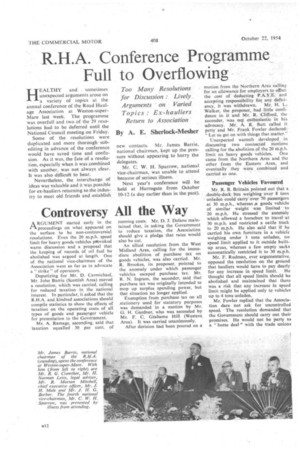Controversy All the Way
Page 46

If you've noticed an error in this article please click here to report it so we can fix it.
ARGUMENT started early in the proceedings on what appeared on the surface to be non-controversial resolutions. Even the 20 m.p.h. speed limit for heavy goods vehicles obvoked warm discussion and a proposal that the keeping of records of oil fuel be abolished was argued at length. One of the national vice-chairmen of the Association went so far as to advocate a " strike" of operators.
Deputizing for Mr. D. Carmichael, Mr. John Barrie (Scottish Area) moved a resolution, which was carried, calling for reduced taxation in the national interest. In particular, it asked that the R.H.A. and kindred associations should compile statistics to show the effects of taxation on the operating costs of all types of goods and passenger vehicle for presentation to the Government.
Mr. A. Ramage, seconding, said that taxation equalled 30 per cent. of
running costs. Mr. D. J. Deane maintained that, in asking the Government to reduce taxation, the Association should give a pledge that rates would also be cut.
An allied resolution from the West Midland Area, calling for the immediate abolition of purchase tax on goods vehicles, was also carried. Mr. R. Brookes, its proposer, pointed to the anomaly under which passenger vehicles escaped purchase tax. Mr. R. N. Ingram, the seconder, said that purchase tax was originally intended to mop up surplus spending power, but that situation no longer applied.
Exemption from purchase tax on all .stationery used for statutory purposes was demanded in a motion by Mr. G. I4. Gardner, who was seconded by Mr. F. C. Grahame Hill (Western Area). It was carried unanimously.
After derision had been poured on a




































































































